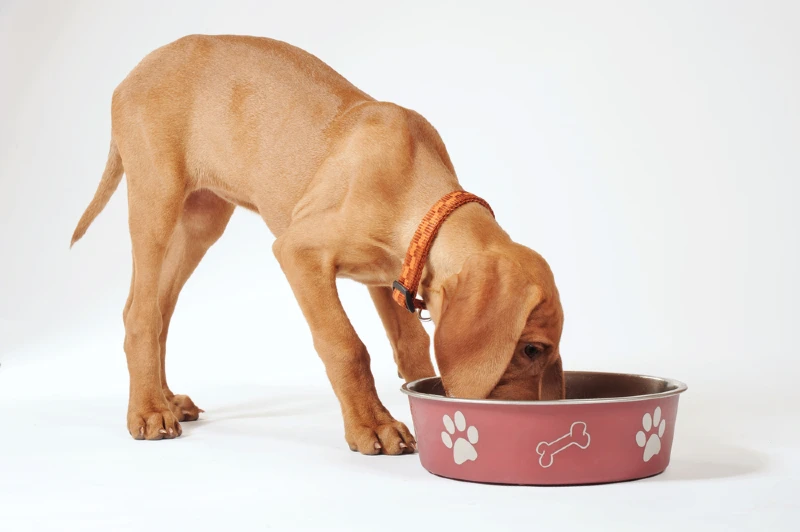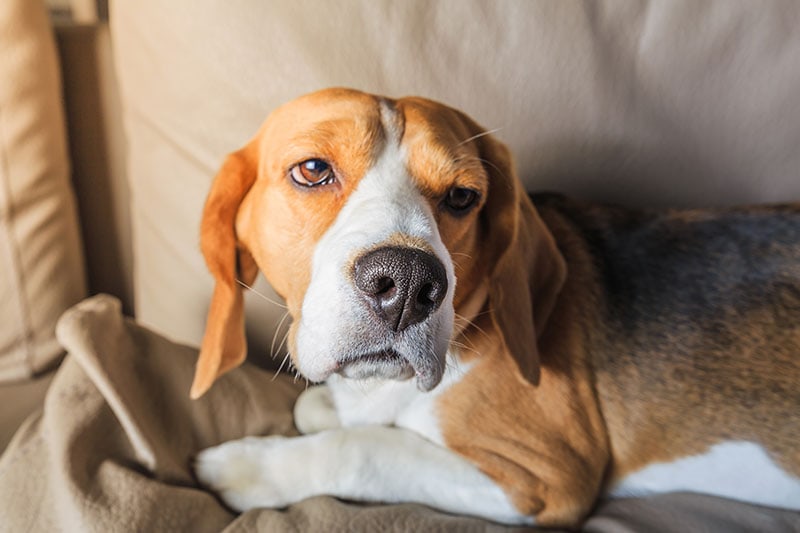
Click to Skip Ahead
Every dog owner knows that a good diet is crucial to their dog’s mental and physical health. But sometimes, even their full stomachs don’t stop them from eating like somebody wants to steal their food!
Many breeds, like Labradors, are known for eating fast, but sometimes even small dogs can behave this way. If your dog is displaying this behavior, you’re in the right place because we’ll tell you why your pooch is eating fast and how to solve this problem.
The 5 Reasons Why Dogs Eat So Fast
1. Competing for Food
Domestic dogs are descendants of wolves, and they left many of their characteristics in the past—but not all. Competing for food is something that they would do if they were still living in the wilderness in packs. The wolves needed to hunt the food and save their food from other predators, so the best way was to eat the food as fast as possible. In some way, your dog resembles the actions of their ancestors.
This behavior often occurs if you have other dogs or animals in your household because your dog sees them as potential food stealers. You will sometimes see that your dog is also growling and showing teeth; they are doing that as a warning that others should stay away from the food. Sometimes dogs also see humans as a potential threat to their food, and if you notice any aggressive behavior, you should go to a professional trainer to solve this behavior.

2. Poor Diet
The second reason is that their daily diet may need more nutrients. Fast eating often happens when feeding your dog food that needs to be more well-balanced. Their diet requires a lot of protein, minerals, vitamins, and fiber. They are omnivores, meaning they eat meat and plants. So, when picking the right fit for your dog, try looking for high-quality food that contains all of these nutrients crucial for your dog’s health.
3. Hunger
Eating fast can also simply be a sign that your dog is hungry. Sometimes owners forget to feed their dogs; and when they do, they eat the food fast. That is perfectly normal, but there are instances when the dog has a fast metabolism or a lot of daily activities, which makes them lose a lot of energy, and both of these situations can result in your dog eating rapidly. If you have a very active dog, they must have regular meals to regain energy.

4. Habit
If you rescued a dog from a shelter, they may be confused by the new feeding schedule. For instance, people that cared for your dog before you may have fed them more frequently than you, and your dog got used to that feeding schedule. So, when it finally comes to eating, your dog can’t contain their appetite. When getting a new dog, you should try to adjust your feeding schedule slowly, so there won’t be any problems.
5. Illness
Eating fast can also indicate that your dog may have an unknown illness that needs treatment. Intestinal parasites and more serious chronic diseases can cause increased appetite, resulting in fast eating. When it comes to intestinal parasites, the most common are:
But all of these parasites usually have other symptoms, like diarrhea or vomiting, which also make your dog lose a lot of nutrients and energy, resulting in increased appetite and fast eating. If you see these symptoms take your dog for a veterinary check-up to determine the exact cause of the problem.
When it comes to chronic illness, the most common are diabetes and Cushing’s Disease because they cause increased appetite. Other signs also happen in dogs with these illnesses, like increased drinking, urination, and excessive weight loss. So again, if you have any doubts, take your dog to the veterinarian as soon as possible.

Dangers of Eating Fast
Few people know that fast eating can be extremely dangerous for your canine companion. When eating fast, dogs don’t chew food properly and swallow large pieces that sometimes get stuck in their esophagus or larynx and cause choking.
Another problem caused by fast eating is gastric dilatation and volvulus, which can be a life-threatening disease. In these instances, your dog’s stomach twists around itself and starts to fill in with gas. A twisted stomach causes bloat and extreme pain. Fast eating can also cause vomiting, gagging, and missing out on essential health nutrients.

How To Solve This Problem
There are a few ways to stop your dog from eating fast, but the most common way is through specially designed-food bowls. These bowls are made with obstacles that make your dog take smaller quantities of food at a time. These bowls will initially make your dog a little frustrated, but they’ll get used to it over time.
Food puzzles are similar but will make eating more fun because they have small compartments to place food and let your puppy explore them.
Conclusion
Some dogs eat food faster because they feel threatened by other animals, some do it out of habit, or they may have an illness you’re unaware of. Either way, your role as an owner is to recognize the root of the behavior, and if you have doubts about your dog’s health, take measures to solve them.
Even if your dog is healthy, fast eating can cause other health problems that can be dangerous to your dog, so it’s best to try and slow their eating down.
Featured Image Credit: AndrasKiss, Shutterstock
The post Why Does My Dog Eat So Fast? 5 Reasons & How to Help appeared first on Pet Keen.




